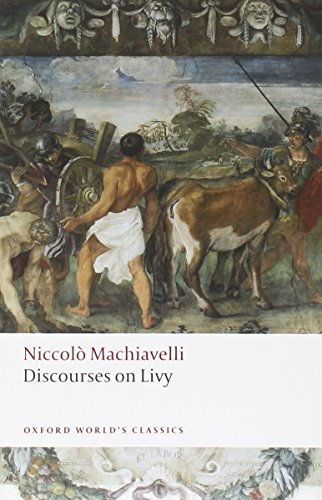Discourses on Livy (Oxford World's Classics)
Niccolo Machiavelli; Julia Conaway Bondanella; Peter Bondanella
BOOK REVIEW

In a world rife with political turmoil and philosophical debates, Niccolò Machiavelli's Discourses on Livy transcends the mere pages of historical reflection, provoking readers to delve into the very essence of power, governance, and human nature. If you think of political philosophy as a dusty textbook, this masterpiece slaps the dust off and dares you to engage with it on a visceral level. Why should you care about a document written in the early 16th century? Because it's the raw pulse of political strategy wrapped in timeless truths, and you just might find your own beliefs challenged-if not shattered-by Machiavelli's unsparing insights.
The very fabric of our understanding of politics can be traced through the eyes of this Florentine thinker as he meticulously navigates through the turbulent waters of ancient Rome. In Discourses on Livy, Machiavelli takes the works of the Roman historian Titus Livius (Livy) and transforms them into a dynamic commentary that examines the principles of republicanism, civic virtue, and the balance of power. Each page is an invitation to witness the dance between liberty and tyranny, and, trust me, once you step into this arena, there's no walking away unchanged. 💥
For many casual readers, Discourses on Livy might appear as a relic, but that is a perilous misunderstanding. With each word, Machiavelli illuminates the mechanisms of statecraft and lays bare the motivations that drive leaders-and the masses-into action. He argues that a strong republic, grounded in civic engagement and public virtue, is the bedrock of a flourishing society. But look deeper, and you will find his unflinching honesty about human nature: selfish, ambitious, and often irrational. Here lies the paradox-Machiavelli was a staunch advocate for the republic in a time when absolute power often reigned supreme. 👑
Readers are divided. Some hail Discourses on Livy as a cornerstone of democratic theory, while others denounce it as a pragmatic endorsement of ruthless ambition. Reviews are rife with fiery contrasts: one critic gushes about Machiavelli's ingenious blend of history and philosophy, while another brands him a cynic whose worldview breeds chaos. What's the common thread? An emotional charge that you cannot ignore. Whether you find yourself at awe beside Machiavelli's brilliance or repulsed by his unyielding realism, the debate stirs the soul. It's a tempest that compels you to wrestle with your own beliefs about authority and morality.
What makes this work even more engaging is its contextual backdrop-a tumultuous Italy on the brink of renaissance. Machiavelli's experience in diplomatic affairs and warfare provides a concrete foundation for his theories. You feel the tension, the heartbeat of a society desperately searching for stability, and it reverberates through your core. Isn't it exhilarating to see history talk back to us, influencing our thoughts and actions today? This is not simply a historical discourse but a call to arms for contemporary leaders and citizens alike to engage in the perpetual struggle between power and responsibility.
And let's not forget the broader impact of Discourses on Livy on political thought. From the Founding Fathers of America-who were heavily influenced by Machiavelli's ideas-to modern-day political theorists, this seminal work continues to resonate. What does this mean for you as a reader? The knowledge that these ideas have shaped the thoughts of some of the most pivotal figures in history should ignite a firestorm of curiosity. How does power operate? What is the cost of idealism in politics?
So, here you are, at a crossroads-will you be an observer or a participant in this dialogue about governance? Will you allow Machiavelli's fierce declarations on humanity and politics to linger in your mind, or will you dismiss them as the antiquated musings of a bygone era? The choice is yours but the implications are profound. Discourses on Livy beckons you, not merely for a read, but for a profound relationship with the worlds it opens.
As you close the last page, ask yourself: What if the real lesson is not just in the politics of yesterday, but in preparing you for the political realities of today? Get ready to be compelled, shocked, and ultimately transformed. Dive in, and discover a Machiavelli who is not merely a philosopher of the past but a vital thinker who pulses life into our political conversations today. Each sentence serves as a mirror to hold up to our own often messy reality, and the reflection might just be more telling than you anticipated. Are you ready to confront it? 🔥
📖 Discourses on Livy (Oxford World's Classics)
✍ by Niccolo Machiavelli; Julia Conaway Bondanella; Peter Bondanella
🧾 290 pages
2009
#discourses #livy #oxford #worlds #classics #niccolo #machiavelli #NiccoloMachiavelli #julia #conaway #bondanella #JuliaConawayBondanella #peter #bondanella #PeterBondanella